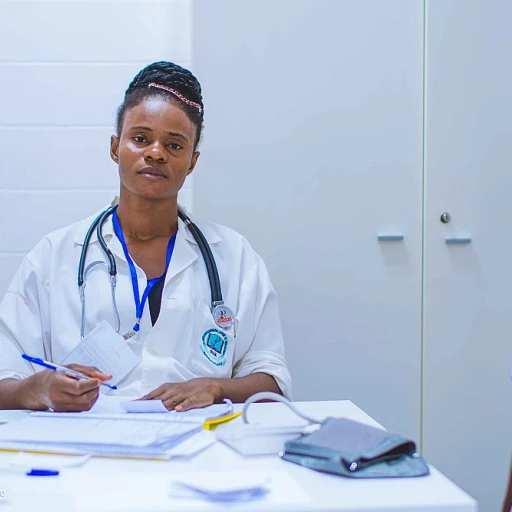
Understanding the Role of Meetings in Healthcare
The Centrality of Meetings in Healthcare
Meetings are an integral part of the healthcare sector, where effective communication can significantly impact patient outcomes. Sharing reflections within a team helps foster a culture of gratitude and positivity, enhancing the overall patient care provided. Healthcare workers often engage in meetings to discuss patient care strategies, share insights, and align their roles in improving healthcare delivery. In this fast-paced environment, healthcare professionals will find that meetings play a crucial role in maintaining a high standard of care. They provide a platform to reflect on what went well and identify opportunities for improvement. Whether it's a day-to-day briefing or a more comprehensive joint commission consultation, these gatherings are vital for the sustainability of good health practices. Healthcare organizations and providers must navigate the challenges inherent in this environment. Meetings serve not just as communication channels but also as a medium for fostering collaboration and teamwork among healthcare workers. Having meaningful reflections within these sessions can help refine practices and motivate team members, ultimately leading to enhanced patient outcomes. A thoughtful approach to meetings can bridge the gap between healthcare workers and their goals. By reflecting positively on their experiences, teams are empowered to make significant contributions to patient care. The adoption of effective communication strategies in healthcare settings is essential to building engagement and trust, a topic further expanded in our exploration of HR communication's role in leadership.Challenges in Healthcare Meeting Communication
Communication Barriers in Healthcare Meetings
In the fast-paced world of healthcare, meetings are crucial for ensuring patient care and improving outcomes. However, effective communication during these meetings can be challenging. Healthcare workers often face barriers that hinder productive discussions, impacting the quality of care patients receive. Understanding these challenges is essential for fostering positive change in healthcare reflections.
Time Constraints and High Stakes
Healthcare professionals operate under significant time pressures. With patient care as a priority, finding time for comprehensive meetings can be difficult. This often results in rushed discussions, where critical details might be overlooked. Additionally, the high-stakes nature of healthcare decisions adds pressure, making it harder for team members to communicate openly and effectively.
Multidisciplinary Team Dynamics
Healthcare meetings often involve diverse teams, including doctors, nurses, and administrative staff. Each group brings unique perspectives and expertise, but these differences can lead to communication gaps. Misunderstandings and misalignments in goals can arise, affecting the team's ability to work cohesively towards improving patient outcomes.
Emotional and Behavioral Health Factors
The emotional toll of healthcare work cannot be underestimated. Behavioral health issues, such as stress and burnout, can affect how healthcare providers communicate during meetings. When team members are overwhelmed, they may struggle to engage in meaningful reflections, impacting the overall effectiveness of the meeting.
Strategies for Overcoming Communication Challenges
To enhance communication in healthcare meetings, it is crucial to address these barriers head-on. Implementing engaging leadership icebreakers can help build trust and foster open dialogue among team members. Encouraging a culture of gratitude and positivity can also improve team dynamics, making it easier for healthcare workers to collaborate effectively.
Strategies for Effective Meeting Reflections
Fostering Effective Meeting Reflections for Healthcare Teams
In healthcare, reflections on meetings are crucial to improving patient care and outcomes. By engaging in thoughtful reflections, healthcare workers can identify both strengths and areas for improvement, ultimately benefiting their patients. Here are some strategies to ensure reflections after meetings are as effective as possible:- Encourage Open Dialogue: Creating a safe space where team members can express honest opinions without fear of judgment fosters positive reflection. This openness can lead to a better understanding of specific challenges faced during patient care, enabling healthcare teams to devise solutions collaboratively.
- Embrace a Culture of Gratitude: Incorporating gratitude into meeting reflections can enhance the morale of healthcare workers. Acknowledging the dedication and hard work of team members, and celebrating even small successes, can promote a positive environment that energizes the team and improves the overall quality of care.
- Utilize Reflective Questions: Guiding the reflection process with strategic questions can provide deeper insights. Ask questions like "How has today's meeting helped us improve patient outcomes?", "What did we learn about our approach to patient care today?", and "How can we ensure such positive results consistently?" for productive introspections.
- Implement Feedback Loops: Establish regular feedback loops where team members follow up on previous reflections. This continuous process helps maintain alignment with healthcare goals and ensures accountability, fostering improvements and positive change over time.
- Leverage Reflective Tools and Technologies: Integrating technology into reflection processes can be highly beneficial. Using tools that facilitate easy documentation of reflections and track progress over time aids in realizing the tangible benefits of this practice. The right tools can streamline the reflection process, allowing health professionals to focus deeply on their observations and insights.
Human Resources' Role in Enhancing Meeting Communication
Enhancing Communication in Healthcare Meetings
In healthcare settings, effective communication during meetings can significantly impact patient care and outcomes. To ensure these meetings are productive, human resources play a critical role in fostering an environment where healthcare workers can exchange ideas and insights openly.Firstly, human resources can assist by reinforcing the importance of gathering reflections from healthcare team members. This allows health care providers to share patient care experiences, which can often lead to improved healthcare practices and innovative solutions. Active participation from all attendees in reflections work meetings prioritizes inclusivity and ensures diverse perspectives are heard.
Furthermore, human resources can spearhead initiatives that continually update communication training. This empowers healthcare workers to engage positively and constructively in meetings healthcare. Providing workshops on active listening and non-verbal communication can enhance the relational dynamics among team members, crucial for effective meetings.
In addition, it is essential for HR to advocate for a culture of gratitude and appreciation, recognizing the efforts of care workers after each work meeting. Leveraging motivational quotes that resonate with the values of healthcare can foster a positive atmosphere, encouraging team members to share their thoughts candidly. Adopting gratitude rituals that conclude meetings can leave participants feeling valued as they continue their day-to-day tasks.
Lastly, Human Resources should ensure that organizational policies align with communication best practices. This could involve regular reviews of the methods that team members use to report patient outcomes during meetings. By doing so, HR not only addresses current communication challenges but also sets a standard for future meetings. Enabling transparent communication channels assures that reflections work contributes to a cohesive healthcare strategy. By actively participating in healthcare meetings, human resources can help create a collaborative environment that enhances communication – ultimately leading to greater employee engagement and patient outcomes.
Tools and Technologies to Aid Meeting Reflections
Leveraging Innovative Tools for Reflective Meetings
In the fast-paced environment of healthcare, meetings hold a significant role in aligning teams and improving patient outcomes. However, even these essential gatherings can be enhanced through the judicious application of technology and tools that foster reflection and understanding. Bullet points can be utilized effectively to describe the following:- Digital Platforms: Incorporating digital platforms designed for meeting reflections can be beneficial for healthcare organizations. These platforms allow team members to document their thoughts, assess what worked well, and pinpoint areas needing improvement. Utilizing such technology ensures that reflections are accessible and can be revisited whenever needed, fostering continuous improvement in healthcare work.
- Utilizing Surveys and Feedback Tools: Feedback is a crucial component in enhancing meeting communication. Tools that facilitate anonymous surveys can be particularly useful in gauging the team’s thoughts on the meeting's effectiveness. This form of feedback allows healthcare workers to communicate openly about any barriers they perceive in patient care discussions and other vital healthcare topics discussed in meetings.
- Behavioral Health Assessment Tools: Integrating assessment tools tailored to behavioral health can offer healthcare providers insights into team dynamics and emotional states. Understanding these elements can help identify stressors among healthcare workers, thereby fostering a positive work environment conducive to more productive reflections.
Case Studies: Successful Meeting Reflections in Healthcare
Examples of Effective Meeting Reflections in Healthcare
Reflecting on meetings in healthcare can significantly improve patient outcomes, enhance teamwork, and boost overall organizational efficiency. Below are a few illustrative case studies demonstrating successful meeting reflections in the world of healthcare. These examples underscore how structured reflections can harness positive changes in daily operations.
Utilizing Gratitude and Appreciation
One healthcare organization implemented a system where, at the end of each work meeting, every team member expressed gratitude for a positive aspect of patient care they observed. This simple act of sharing motivational quotes and experiences fostered a culture of gratitude and positivity, fundamentally enhancing the workplace environment. Over time, care workers reported feeling more valued and connected, which in turn reflected in improved patient care and satisfaction rates.
Incorporating Feedback Loops
Healthcare providers at a large hospital established a feedback mechanism as part of their meeting reflections. They allowed team members to openly discuss challenges in patient care and explore solutions collaboratively. This approach promoted behavioral health awareness and offered a platform for joint commission with stakeholders, leading to more efficient healthcare delivery strategies.
Time Management and Agenda Setting
A behavioral health center found that structuring meetings with a clear agenda and strict time frame agenda enhanced meeting productivity. Reflections were incorporated at the end of each session to review what was achieved and identify areas for improvement. This practice of systematically reflecting on each meeting helped the team to better manage their time and prioritize patient needs effectively.
These case studies highlight the potential benefits of institutionalizing reflection practices in healthcare work meetings. By addressing specific challenges and fostering an environment of openness and gratitude, healthcare organizations can drive significant improvements in both healthcare workers' experiences and patient care outcomes.













